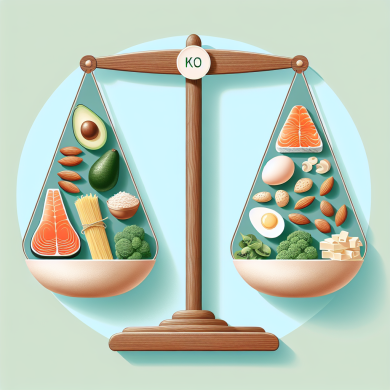Spotting Common Pitfalls in the Keto Journey
Introduction
The ketogenic diet, popularly known as the keto diet, has gained immense popularity for its potential to help individuals lose weight, improve mental clarity, and increase energy levels. By drastically reducing carbohydrate intake and replacing it with fats, the body enters a state of ketosis, where it becomes efficient at burning fat for energy. However, embarking on a keto journey isn’t as straightforward as it seems. Many individuals encounter common pitfalls that can hinder their progress and affect their health. This article aims to shed light on these pitfalls and provide guidance on how to navigate them effectively.
Misunderstanding Macronutrient Ratios
One of the foundational principles of the keto diet is adhering to specific macronutrient ratios: high fat, moderate protein, and low carbohydrates. A common pitfall is misunderstanding or miscalculating these ratios. Many newcomers to the diet underestimate the amount of fat they need to consume and overeat protein, which can prevent the body from entering ketosis. It’s crucial to understand that proteins can convert to glucose through gluconeogenesis, potentially disrupting ketosis.
The solution is to carefully calculate your macronutrient needs based on your body weight, activity level, and health goals. Utilizing a reliable keto calculator and monitoring your intake with a food diary or app can help ensure you stay on track.
Neglecting Electrolyte Balance
As the body transitions into ketosis, it undergoes a significant loss of water and electrolytes, resulting in symptoms commonly known as the “keto flu.” Symptoms can include fatigue, headaches, irritability, and muscle cramps. This electrolyte imbalance is often due to a lack of sodium, potassium, and magnesium.
To avoid this pitfall, it’s essential to replenish these vital minerals. Incorporating foods rich in electrolytes, such as leafy greens, avocados, nuts, and seeds, can help. Additionally, using supplements or electrolyte powders can aid in maintaining proper balance, especially in the initial stages of the diet.
Overlooking Hidden Carbohydrates
Many foods that seem keto-friendly may contain hidden carbohydrates that can disrupt ketosis. Processed foods, sauces, dressings, and even some vegetables can have higher carbohydrate content than expected. This misstep can stem from not thoroughly reading nutrition labels or misunderstanding serving sizes.
To address this pitfall, always read labels carefully and be mindful of portion sizes. Preparing meals at home using whole, unprocessed ingredients can also help control carbohydrate intake and ensure you stay within your daily limits.
Ignoring Fiber Intake
While the keto diet emphasizes low carbohydrates, it’s important not to neglect dietary fiber, which is crucial for digestive health. A diet low in fiber can lead to constipation and other gastrointestinal issues, which are common complaints among those on a keto diet.
To maintain proper fiber intake, include non-starchy vegetables, nuts, seeds, and low-carb fruits like berries in your diet. These foods not only provide essential nutrients but also help promote a healthy gut.
Inadequate Hydration
Staying hydrated is vital for overall health, but it’s particularly important on a keto diet. The body’s shift in metabolism increases fluid loss, which can lead to dehydration if not properly managed. Dehydration can exacerbate symptoms of the keto flu and negatively impact physical performance and mental clarity.
To avoid this pitfall, ensure you’re drinking adequate water throughout the day. A general guideline is to consume at least half your body weight in ounces of water daily, adjusting for activity level and climate.
Overconsumption of Processed Keto Products
The market is flooded with processed “keto-friendly” products, from snacks and bars to meal replacements. While these can be convenient, they often contain unhealthy additives, artificial sweeteners, and hidden carbs that can impede your progress.
It’s best to focus on whole, nutrient-dense foods and use processed products sparingly. When you do opt for these items, carefully scrutinize ingredient lists and choose products with minimal additives and sugar substitutes.
Focusing Solely on Weight Loss
Many individuals embark on the keto journey with the primary goal of losing weight. While weight loss can be a significant benefit, it’s important not to overlook other health markers, such as blood sugar levels, cholesterol, and overall energy and wellbeing.
Shifting the focus from just the scale to a more holistic view of health can help sustain motivation and ensure that the diet is benefiting your overall health and not just your waistline.
Failing to Plan Meals and Snacks
Lack of preparation is a common pitfall that can lead to poor food choices and derail your keto journey. Without a plan, you might find yourself reaching for convenient high-carb options, especially when dining out or during busy days.
Meal prepping and planning your snacks can help you stay committed to your keto goals. Having keto-friendly meals and snacks readily available can prevent impulsive eating and help maintain ketosis.
Setting Unrealistic Expectations
The keto diet is often portrayed as a quick fix for weight loss, leading many to have unrealistic expectations about how fast they will see results. This can lead to frustration and eventual abandonment of the diet if quick results aren’t achieved.
Understanding that sustainable weight loss and health improvements take time is crucial. Setting realistic goals and celebrating small victories along the way can help maintain motivation and commitment to the diet.
Conclusion
The ketogenic diet can be an effective tool for weight loss and improving overall health, but it’s not without its challenges. By being aware of and avoiding these common pitfalls, you can enhance your keto journey and achieve your health goals. Remember, success on the keto diet involves more than just cutting carbs; it requires a balanced approach, careful planning, and a focus on overall health and wellbeing. With the right mindset and strategies, you can navigate the keto journey successfully and reap its many benefits.















Add comment